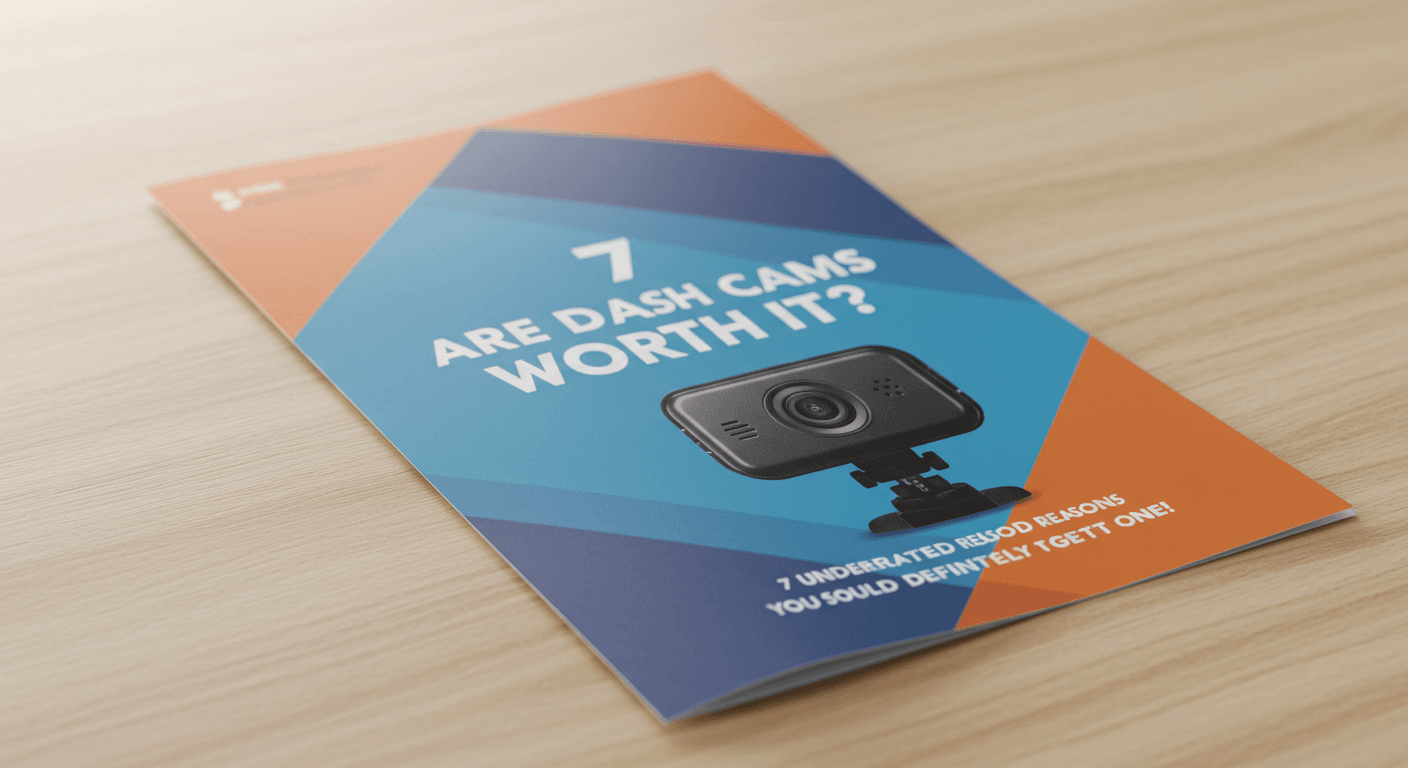Table of Contents
Powerful Introduction: Why Is Everyone Talking About Dash Cams Today?
Imagine this: you’re involved in an accident, fault is unclear, and everyone has a different version of what happened. Who do you believe? That’s where a dash cam steps in—your silent, impartial witness, always ready.
So, why the sudden surge in popularity?
Dash cams are no longer reserved for taxi drivers or content creators. In 2025, they’ve become an essential tool for families, rideshare drivers, transport professionals, and insurers alike. The reasons are clear: they offer enhanced safety, accountability, and even the chance to capture unexpected moments.
Here’s what this guide will uncover:
- What a dash cam actually does—and what it doesn’t.
- Everyday benefits for different types of drivers.
- The key downsides to be aware of.
- Real testimonials and user cases.
- And ultimately: are dash cams worth it?
What a Dash Cam Really Does: Recording, Evidence, Parking Surveillance
A dash cam is far more than a basic recording device.
It’s your always-on digital co-pilot. Here’s what it brings to the table:
- Continuous recording as soon as the car starts; most devices loop the footage.
- Evidence in accidents, often used by insurance companies or courts.
- Parking surveillance, with motion detection while the engine is off.
- Built-in GPS, recording both speed and location.
- Incident detection, where G-sensors lock footage after an impact.
How it works:
- Mounted to the windshield or dashboard.
- Powered via the car’s cigarette lighter or an external battery.
- Footage stored locally on an SD card or online via cloud storage.
Real-Life Benefits: For Families, Rideshare Drivers, Insurers, and Legal Disputes
Think dash cams are just another tech gadget? Think again.
They can meaningfully improve everyday driving in numerous ways:
For Families:
- Monitor teen drivers’ behavior.
- Increase safety during school commutes.
- Provide evidence in minor accidents or unsafe encounters.
For Rideshare and Commercial Drivers:
- Protect against aggressive or dishonest passengers.
- Minimize disputes with ride platforms.
- Boost confidence during late-night shifts.
For Insurance Providers:
- Streamline claims processing.
- Help detect and reduce fraudulent activity.
- Some companies offer premium discounts.
In Legal Situations:
- Provide indisputable visual proof.
- Support legal defense.
- Ease post-accident stress and uncertainty.
Potential Drawbacks to Consider: Privacy, Legal Concerns, Cost, and Storage
Dash cams offer many benefits—but they’re not without limitations.
Privacy:
- Recording public spaces may raise legal or ethical concerns.
- Footage should be anonymized before publishing (e.g., blur faces or license plates).
Legal Aspects:
- Dash cams are legal in many countries, though with varying rules.
- In France, footage must not be stored for more than a month unless part of a dispute.
Cost:
- Prices range from €40 to €400+, depending on features.
- Premium features like 4K video, GPS, or cloud backups cost more.
Storage:
- SD cards can fill up quickly.
- Important files may be overwritten unless manually saved.
- Cloud solutions offer convenience, but usually require a subscription.
User Testimonials and Case Studies: Real Stories and Reviews
First-hand experiences speak volumes. These real-life examples provide perspective:
- Almost EVERYONE is Wasting Money on Dash Cams — Analysis of common mistakes and poor investments.
- Dashcam Testimonial by a Commercial Business Fleet Owner — Commercial fleet feedback.
- First Time Dashcam User Test The ddpai Z40 Dashcam — Entry-level user review.
- The Best Dash Cam I’ve Used So Far | 70mai Dash Cam — High-end model insights.
- The Truth About Dash Cams — Honest performance breakdown.
- Qubo Dashcam Pro X vs CP Plus — Product comparison.
Key takeaways:
- Dash cams can de-escalate or resolve incidents.
- They protect drivers in unexpected situations.
- They may save drivers significant legal and financial costs.
Final Verdict: Is It Worth It? Cost-Benefit Review and Buying Guide
Spoiler: Yes, dash cams are worth it—if you choose the right one.
Comparison Table:
| Model | Avg. Price | Key Features | User Rating |
|---|---|---|---|
| VIOFO A119 V3 | €80 | 2K, GPS, reliable | 4.5/5 |
| Garmin Dash Cam Mini 3 | €130 | Ultra-compact, Full HD | 4.5/5 |
| Nextbase 622GW | €399 | 4K, Alexa, SOS alerts | 5/5 |
| Vantrue N4 Pro | €300 | Triple-channel, night mode | 4.5/5 |
Buying Recommendations:
- Budget option: VIOFO A119 V3.
- For discreet recording: Garmin Mini 3.
- Top-tier features: Nextbase 622GW.
- For professional use: Vantrue N4 Pro.
FAQs
1. Are dash cams legal in every country?
Not always. In France, for example, they are legal but must respect privacy laws. Avoid recording audio and blur faces in published footage.
2. How much are dash cams?
Prices range from €40 to €500+. More features mean higher cost.
3. How does a dash cam work?
It records continuously while driving. Some models detect accidents and save footage automatically.
4. What is the best dash cam for beginners?
The Garmin Dash Cam Mini 3 is compact, easy to install, and beginner-friendly.
5. Is installation complicated?
Most models install easily with adhesive mounts and plug into your car’s power outlet. Parking mode requires optional hardwiring.

